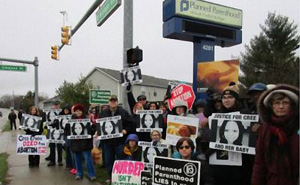Grand Jury says “common interpretation” cannot be applied to abortion laws
By Cheryl Sullenger, Operation Rescue Senior Policy Advisor
A citizen-called grand jury was discharged last week without issuing indictments against Wichita abortionist George R. Tiller for violations of the state ban on post-viability abortions. In parting, the grand jury released a statement through the District Attorney’s office, explaining their unwillingness to indict based their belief that a “common interpretation” of Kansas law is not appropriately applied to abortion statutes. (Read the statement)
After “hearing extensive witness testimony, reviewing volumes of documents and medical records of patients of Women’s Health Care Services,” the panel of fifteen citizens concluded that they found many instances where late abortions were “questionable” as to the diagnosis of “substantial and irreversible impairment.”
A 1998 law, K.S.A. 65-6703, states that abortions past 22 weeks must be evaluated for viability, the ability of the pre-born baby to live outside the womb. Once viability is determined, those abortions can only be done for two reasons: to save the life of the mother, or to prevent “substantial and irreversible impairment of a major bodily function” of the mother should the pregnancy continue – and then only when two non-affiliated physicians agree that the abortion is medically necessary.
As to the first exception, according to the Kansas Department of Health and Environment, there has never been a reported case in Kansas history that a late-term abortion was done to save the mother’s life. Why? Because every state allows for abortions under dire medical emergencies where continuation of the pregnancy would cause the imminent death of the mother, even if late-term abortions were otherwise banned. There is no reason for women to travel to Kansas to receive such abortions, and it is likely, given the extreme medical emergency such a condition would present, that a woman would be incapable of traveling to another state at such a time.
Therefore, the obvious conclusion is that women in the latest stages of pregnancy come to Kansas to have abortions in order to circumvent the laws of their home states.
As to the second exception, the grand jury acknowledged that it was the intent of the legislature to limit late-term abortions. A common reading of “substantial and irreversible impairment of a major bodily function” would certainly call into question the legality of many abortions reviewed by the grand jury. However, former Attorney General Carla Stovall issued an opinion in 2000 that stated mental health must be included as a “major bodily function,” and concluded that such mental health risks must also meet the standard of “substantial and irreversible.”
This is where the jury members depart from a “common interpretation.”
The definition of a “substantial and irreversible” mental health risk so debatable, according to the grand jury, that if two doctors approve such an abortion, no one can question their judgment. Therefore, if other physicians disagree that a mental health risk does not meet the legal standard of “substantial and irreversible” that is just their opinions and should not be considered as to the legality of the abortion.
Applying that line of reasoning to other situations, we can see the strain of logic.
Imagine a physician and his partner who mis-prescribes painkillers, resulting in the deaths of dozens of his patients. What if no one could question their judgment? This is actually a real situation currently making headlines in Wichita. That physician and his wife were jailed and face federal felony charges. Certainly no one is arguing that because the two agreed, they cannot be held accountable for violating the “common” reading of the law.
Tiller is, in fact, currently facing 19 counts of illegal late-term abortions done in 1993, because he was “in cahoots” with another abortionist, Ann Kristin Neuhaus, who rubberstamped all his late abortions as being medically necessary on “mental health” grounds, violating the “non-affiliated physician” clause in the abortion law. The grand jury never addressed an additional four years of abortions during which Tiller and Neuhaus operated what amounted to an illegal abortion racket.
A prominent expert in the field of psychiatry, Dr. Paul McHugh of Johns Hopkins University Hospital, reviewed over two dozen abortion records for the Attorney General’s office and concluded that he saw no file in which a late-term abortion was medically necessary according to the law, even with the Stovall opinion that the law includes “substantial and irreversible” mental health risks. (Listen to Dr. McHugh’s Interview.) Dr. McHugh stated that reasons for late abortions included such trivial reasons as the following:
One woman felt the continuation of her pregnancy would prohibit her from attending a rock concert. One woman believed that her pregnancy would interfere in sporting events. Another woman believed that if she continued her pregnancy, she could not afford to buy a new computer. Several women were diagnosed with a single episode of depression – hardly an “irreversible” condition.
Certainly it takes an “uncommon interpretation” of the law to conclude that any of these circumstances meet the legal standard of “substantial and irreversible.”
In fact, women who are actually getting the late abortions do not believe they are getting them for mental health risks. They have told Operation Rescue and other pro-lifers that they are getting the abortions for reasons that simply do not comply with the law.
Operation Rescue submitted to the grand jury documentation that show numerous women getting late abortions for illegal reasons. Those include:
Five women who were coerced or forced into unwanted late-term abortions by boyfriends or family. All regretted their abortions and suffered mental pain as a result. One woman who had an abortion because she didn’t want to ruin the effects of her “tummy tuck” cosmetic procedure. One woman who had a late-abortion for financial reasons. One woman who went ahead with a late-abortion even though her insurance provider evaluated her condition and determined than an abortion was not medically necessary and therefore denied her coverage. Numerous women who had late-abortions for fetal anomalies. Once instance where a woman who was approved for an abortion at WHCS due to fetal anomaly, changed her mind and gave birth to a perfectly healthy child without adverse affects to her physical or mental health. One instance where a woman who was approved for an abortion on a healthy baby at WHCS changed her mind and later gave birth without any adverse affects to her physical or mental health.
It is clear that the mental health excuses used by Tiller and his cohorts are simply window dressing used to disguise the truth that they are aborting pre-born babies, up until the day of delivery, for reasons that do not meet standards outlined in the legal exceptions.
While the grand jury acknowledges that the intent of the legislature was to limit late abortions, the practical result is that Tiller and his supporters in the District Attorney’s office have redefined the language to include abortions for any reason at any gestational age.
It certainly did take an “uncommon interpretation” to come to that conclusion.
Where did that unorthodox take on Kansas law come from? One need not look farther than the District Attorney’s office, which is currently run by Nola Foulston, a radical abortion supporter and personal friend of Tiller’s. It was Foulston who persuaded a judge to dismiss 30 criminal charges against Tiller filed by former Attorney General Phill Kline on dubious jurisdictional grounds, even though two judges independently concluded that there was probable cause to believe that Tiller violated the law.
Not coincidently, Assistant District Attorney Ann Swegle, who managed the recent grand jury, also managed the grand jury that investigated Tiller in the third-trimester botched abortion death of Christin Gilbert. A former grand juror came forward and told Operation Rescue of a number of incidents where Swegle prevented the jurors in the Gilbert investigation from accessing evidence and witnesses, and misdirected them as to the scope of their investigative powers.
It was because of this that the petition seeking the more recent grand jury demanded a special prosecutor unrelated to the DA’s office. But that did not happen. There is little doubt that Swegle, under the direction of Foulston, is behind the “uncommon interpretation” of K.S.A. 65-6703, that led the grand jury to believe it could not indict.
In fact, a confidential source close to the grand jury investigation told Operation Rescue that Foulston personally told the grand jury that the law was unenforceable.
Without the support from Foulston that any indictments would be prosecuted, it became useless to indict.
It is obvious that there can be no further requests for grand juries until the District Attorney’s office is purged of corruption along with Tiller cronies such as Foulston and Swegle.
The grand jury also stated that the Legislature needed to “provide clearer and more definitive guidelines regarding ‘substantial and irreversible impairment,’” or provide new legislation limiting late-term abortions.
“We see no reason to re-invent the wheel,” said Operation Rescue President Troy Newman. “The laws of the State of Kansas are sound. However, we would support a clarification by the Legislature of the terms ‘substantial and irreversible’ for the sake of those who cannot understand their common usage in the English lexicon.”
The Foulston interpretation of the state ban on post-viability abortion places Kansas to the left of even the most radical supporters of abortion. Even Democratic Presidential Candidate Barack Obama, stated recently that he believes that late-term abortions should not be done simply because a woman is feeling “blue.” But that is exactly what we are seeing in Kansas, where, according to Dr. McHugh, the current application of the law would not prevent a single woman from obtaining an abortion up until the moment of birth. That is hardly the intent of the Legislature, even as recognized by the grand jury.
“If Tiller and his lawyers think this is the end of this matter, they are gravely mistaken,” said Newman. “So far all we have seen are political allies who radically support unrestricted abortion, insulating Tiller from accountability to the law through a series of linguistic gymnastics and shady legal maneuverings. We have yet to see anything resembling justice. For the sake of the innocent, viable babies being unjustly aborted, we cannot stop until we do.”







